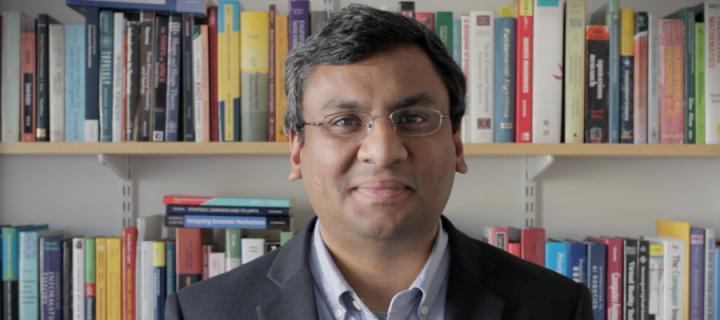A question of robotics
Robotics expert Dr Subramanian Ramamoorthy reveals his passion for artificial intelligence and how he will bring it to Wigtown's Big Bang Weekend in February.

My background
I received my first degree - a Bachelor of Engineering in Instrumentation and Electronics Engineering - from the University of Bangalore in India where I had also grown up. I then moved to the United States, where I received my Master of Engineering in Mechanical and Aerospace Engineering from the University of Virginia.
After completing my Master’s studies, I joined National Instruments, an Austin based company where I worked in various research and development roles in the areas of control design, dynamic simulation and computer vision. This prompted an interest in Artificial Intelligence, which became the topic of my PhD studies at the University of Texas at Austin.
While I owe enormous debts to numerous teachers who have shaped my thinking over the years, the person who most distinctly shaped my professional approach is, of course, my doctoral advisor, Professor Ben Kuipers, whose view that science is a “long, slow conversation” has been very useful guideline for me as I ponder where to focus my attention.
At Edinburgh
I am presently a Reader in Robotics, having been at the School of Informatics for the past ten years. Within the School, I am affiliated with the Institute for Perception, Action and Behaviour. I am also an Executive Committee member of the Edinburgh Centre for Robotics. I have also been privileged to participate in other organisations, as a member of the Young Academy of Scotland at the Royal Society of Edinburgh, and as a Research Theme Leader for Cyber-physical Systems at the Scottish Informatics and Computer Science Alliance.
I greatly appreciate the many colleagues I have had the privilege to work with. However, most of all, I cherish my doctoral students, who have all gone on to take up interesting and promising roles as scientists and entrepreneurs, including faculty positions at top institutions, research and development positions in industry, and leadership roles in start-up companies.
In the near future, I look forward to pursuing several new research projects, exploring issues of explainability and robustness in Artificially Intelligent Systems – in particular, robots that bring unique challenges in the form of physical safety and safe learning and adaptation.
I hope to be able to convey both my wonder at the richness of such questions, and my optimism that we are actually making progress in understanding these issues and embodying them in robots.
Something I know...
A number of people I speak to are often surprised to learn that our work in robotics draws on concepts from so many different disciplines. I am based in the School of Informatics, and think of myself as a computer scientist who specialises in the area of Artificial Intelligence. However, our day-to-day work goes well beyond what one might normally associate with the programming of robots and computers, drawing also on a wide variety of concepts from applied mathematics, psychology, cognitive science and neuroscience. Increasingly, we are also called upon to pay attention to ideas from the social sciences and the humanities, especially when it comes to thinking about trust, fairness and ethical issues.
Big Bang Weekend
I'll be participating in a panel discussion and also giving a public talk at the Big Bang Weekend, which is being held by the Wigtown Book Festival on 2 - 4 February. Ther topic is why robots need common sense knowledge. I am privileged to be working in this area at a time when the whole world seems fascinated by the endless possibilities represented by robotics and AI. However, this level of media attention also comes at the cost - much of the popular discourse is rather poorly informed. Through talks like the one I will be giving at Wigtown, I would like to invite audience members to ponder a few hard but very interesting questions that are at the core of my thinking as a researcher.
I am interested in understanding how robots can behave intelligently, like us humans, in complex and dynamic environments. Underpinning such sophisticated behaviour is the slippery notion of common sense – we humans seem to be able to make sense of the world, through a whole variety of reasoning mechanisms that help us acknowledge that objects have permanence even if most of the time we do not see them; that even if an object has never been seen before, if it floats in mid-air it might be quite light; that when someone says, “the trophy would not fit in the brown suitcase because it was too big”, the “it” refers to the trophy, and so on. How do we efficiently encode all such knowledge in a format that a computational machine could reason about these facts, and use them to inform how it should make sense of the world?
I hope to be able to convey both my wonder at the richness of such questions, and my optimism that we are actually making progress in understanding these issues and embodying them in robots.

